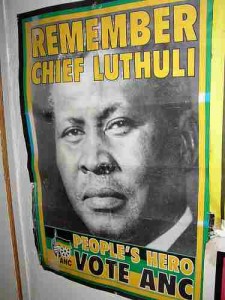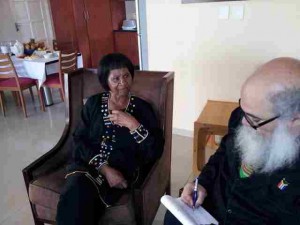Roots to Fruits
Gandhi, Luthuli, and Contemporary South African Nonviolence
by Matt Meyer
An historic gathering of South African activists, U.S.-based civil rights veterans, Indians involved in various constructive programs, and assorted other internationalists convened in Durban last August for a conference on Roots to Fruits: Nonviolence in Action.  Sponsored by the Gandhi Development Trust and Satyagraha newspaper, and organized by Ela Gandhi — a lifelong African National Congress (ANC) leader, former Parliamentarian, and grand-daughter of Mohandas K. Gandhi — the three-day event brought together over one hundred educators, students, community leaders, politicians, and religious figures to discuss the future of nonviolence on a global scale. With a wide diversity of viewpoints on the meaning and contemporary significance of nonviolence — from a tactic for militant resistance to a philosophy which sometimes helps adherents tacitly adjust to the status quo — the best part of the gathering was the networking possibilities amongst a strong and energetic grouping of participants.
Sponsored by the Gandhi Development Trust and Satyagraha newspaper, and organized by Ela Gandhi — a lifelong African National Congress (ANC) leader, former Parliamentarian, and grand-daughter of Mohandas K. Gandhi — the three-day event brought together over one hundred educators, students, community leaders, politicians, and religious figures to discuss the future of nonviolence on a global scale. With a wide diversity of viewpoints on the meaning and contemporary significance of nonviolence — from a tactic for militant resistance to a philosophy which sometimes helps adherents tacitly adjust to the status quo — the best part of the gathering was the networking possibilities amongst a strong and energetic grouping of participants.
One poignant moment which spotlighted the occasionally divergent viewpoints began with a talk from Kirti Menon, Registrar of the University of the Witwatersrand in Johannesburg. Speaking as an administrator about the difficulties of balancing individual rights with the need to maintain a calm space for building higher education, Menon — a great-granddaughter of the Mahatma — noted that often “the room for negotiating is so tight that it is like walking through a tunnel.†With student unrest at a high point, based in part on the fact that educational opportunities are few and far between, violence is sometimes the result; a stampede broke out last year when hundreds of thousands of prospective students and their families attempted to apply for only 700 available academic spots. In the question and answer period of the talk, Wits student leader Pearl Pillay, who successfully coordinated a 2011 protest and hunger strike to spotlight community concerns, challenged Menon to engage directly with her in dialogue for meaningful change.
Another striking sign of different approaches to the contemporary meaning of nonviolence were apparent in the stories told by Allen Onyema, chairman of the Federation for Ethnic Harmony in Nigeria, who extolled the virtues of Shell Oil-sponsored nonviolence training amongst “violent militants†in his country, as evidenced by the successful ability of Shell to pump over 3 million barrels of oil per day without incident. Trained by Dr. King associate Bernard Lafayette (who suggested to participants that “rather than thinking your way into action†sometimes you have to “act your way into thinkingâ€), Onyema’s assertions about Shell led some to caution that such associations would only discredit the radical legacy of nonviolent action. Certainly staunch anti-militarists, like University of Kwazulu-Natal Conflict Resolution and Peace Studies Professor Geoff Harris and Ceasefire Campaign volunteer Gunavant Govindjee who convened a discussion on “de-militarizing South Africa,†take a radically different point of view. And South African-based UNESCO expert Catherine Odora Hoppers, speaking on cognitive justice and restorative action, implored us to look even deeper at the roots of nonviolence and violence. “People have not dealt with structural violence or cultural violence,†she insisted, “but the violence which destroys gradually is much worse†than what we think of traditionally as conflict.
In many ways, however, the most meaningful look at nonviolent roots and their potential current relevance — at least in the South African context — took place after the official closing of the conference during a coordinated visit of attendees to the museum honoring the iconic but little-studied and often misunderstood Chief Albert Luthuli. Luthuli is best known as the recipient of the 1960 Nobel peace prize, the first person outside of Europe or the US to receive this award, and as the President-General of the ANC from 1952 until his death in 1967. His real legacy, however, is less in his titles and citations, but in his commitment to fundamental social change and empowerment relying on diverse but largely peaceful methods of resistance. Controversies surrounding the recent Luthuli biography, Scott Couper’s Bound by Faith (2010) — the first major, well-researched book on the iconic leader — have not helped ensure Luthuli’s proper place in South African or international peace history. Couper’s claims that Luthuli “was never persuaded of the moral or strategic imperative to abandon non-violence†are carefully documented, but did not win supporters amongst the many in positions of power who credit the ANC’s military wing as a major contributor to the end of apartheid.
While in Durban as a presenter at the Roots to Fruits conference, I enjoyed a special audience with Thandi Luthuli-Gcabashe, daughter of the Chief and a respected activist and leader in her own right. Director of the US-based American Friends Service Committee Southeast Regional Office in Atlanta during her many years in exile, Thandi joined South Africa’s Department of Foreign Affairs after the end of apartheid, and was appointed Ambassador to Venezuela, Latin America, and the West Indies. She discussed her own experiences, her upbringing, and her father’s significance today.
“Not enough has been done to commemorate the role my father played in the struggle,†Luthuli-Gcabashe began. “There has been some faction of the ANC that felt he didn’t do justice to the struggle, he didn’t support armed struggle sufficiently. When the ANC’s military wing was founded, he was reluctant to put his stamp of approval on it.â€
Despite this most debated of positions, two other reasons might exist as to why greater scholarship and recognition is not accorded to Luthuli: “Television was not available in the 1940s and 1950s, so the older ANC leaders, who didn’t leave a lot of images, have not been collectively recognized as much. The 2012 ANC Centennial has begun changing things; they have been named, and exposed to the nation. Posterity will judge our leaders more fairly.â€
In addition, Thandi reflected, “my father’s way of doing things, his way of going forward — makes me think that he may have just decided that this was the way he should be remembered. He was very nurturing, very charismatic — leadership qualities you don’t often find today. But he was also very humble and grassroots oriented.â€
“He was very African culturally,†she continued, “yet lived a Western life style, and excelled in Western liberal academic institutions. But that didn’t prevent him from interacting with common people or with royalty, including Zulu royalty. He never lost his heart.â€
 Thandi’s own assessment of her father’s relevance today centers around two basic themes: the importance of women’s voice and the need to have a structural analysis of violence and social change. She noted that at the time when Chief Luthuli was President of the ANC, there were a great number of women — ordinary domestic workers — involved in the organization and its leadership. Luthuli, she asserted, “cared about the uplifting of those people; you’ll find that they were very active during this period. There is a classic story from the 1950s, when an organization of women from KwaMashu, a township outside of Durban, came with sticks to beat up the men who were accepting the injustices of the racially dividing Group Areas Act. “Those women, under my father’s leadership, joined the ANC. As ANC President, he encouraged women at all levels to participate in meaningful ways.â€
Thandi’s own assessment of her father’s relevance today centers around two basic themes: the importance of women’s voice and the need to have a structural analysis of violence and social change. She noted that at the time when Chief Luthuli was President of the ANC, there were a great number of women — ordinary domestic workers — involved in the organization and its leadership. Luthuli, she asserted, “cared about the uplifting of those people; you’ll find that they were very active during this period. There is a classic story from the 1950s, when an organization of women from KwaMashu, a township outside of Durban, came with sticks to beat up the men who were accepting the injustices of the racially dividing Group Areas Act. “Those women, under my father’s leadership, joined the ANC. As ANC President, he encouraged women at all levels to participate in meaningful ways.â€
“At home,†Thandi remembered, “my father could never go out to give a public speech without running it through my mom. This is how much respect he had for her. He raised four very strong daughters; he was the most wonderful father. We could speak together about anything, and we’d sit long after support and talk and talk. At supper every evening, the evening prayer was a mini-service. After that, when my mother and he younger ones went to bed, we would sit and debate and review everything going on in the world. We girls were originally against the 1951 ANC-organized, nonviolent Defiance against Unjust Laws Campaign. But father convinced us. He would sit down and patiently explain his views, and then we enjoyed it; we could go out and participate in some of the protests.â€
Nowadays, Luthuli-Gcabashe believes that education is the key to advancing people’s struggles. Looking at the roots of injustice is essential if we are to truly build a peaceful world. “It is very clear,†she stated, “that violence begets violence — that it doesn’t solve any problem. We need to live and respect each other; humanity dictates that we do so. If you look at KwaZulu-Natal region, before the 1994 elections or even today, violence has been intense largely because resources are scarce. Those things could be solved if there were some attempts at equality. Poverty is a big cause of conflict and the outbreak of war. That is what could be learned from people like my father and Gandhi. It is very difficult when just day-to-day living is a constant struggle, when people don’t see a light at the end of the tunnel.â€
As growing numbers of peoples and organizations look to nonviolent tactics and strategies for change, they would do well to delve deeper into the work of Luthuli, his spirited South African colleagues, and the children who carry on his nuanced and thoughtful history. Thandi’s gentle but forceful energy, her abiding and continuing commitment to the ANC while understanding and embracing the power of unarmed non-cooperation, and her creative and critical thinking about what South Africa needs today from the grassroots right up to the government, speak volumes at a time when principled leadership can be hard to find. As new generations seek to reap the fruits of struggles hard fought and won, humble and visionary elders like the Luthulis point the way for continued, lifelong commitment.
Matt Meyer is an educator-activist, based in New York City, and serves as convener of the War Resisters International Africa Working Group. His recent books include Guns and Gandhi in Africa: Pan-African Insights on Nonviolence, Armed Struggle and Liberation (Africa World Press, 2000), the two-volume collection Seeds of New Hope: Pan African Peace Studies for the 21st Century (Africa World Press, 2008, 2010), and Let Freedom Ring: A Collection of Documents from the Movements to Free U. S. Political Prisoners (PM Press, 2008). Meyer is a contributing member of the Editorial Advisory Board for New Clear Vision.
